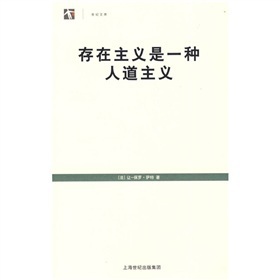Existentialism Is a Humanism
存在主义是一种人道主义
Jean PaulSartre(让·保罗·萨特,1905一1980)
My purpose here is to offer a defence of existentialismagainst several reproaches that have been laid againstit.
在这里,我的目的是要对存在主义所受到的一些指责,提出答辩。
First, it has beenreproached as an invitation to people to dwell in quietism ofdespair. For if every way to a solution is barred, one would haveto regard any action in this world as entirely ineffective, and onewould arrive finally at a contemplative philosophy. Moreover, sincecontemplation is a luxury, this would be only another bourgeoisphilosophy. This is, especially, the reproach made by theCommunists.
首先,存在主义曾被指责为诱导人们安于一种绝望的无为主义。因为如果每一条解决事物之道被阻断了,那么我们就不得不视在这世界上的任何行为都是徒劳无益的,我们最后就会走到一种瞑想的哲学里去。而更甚的是,由于瞑想是一种奢侈,因此我们的学说就不过是另一种布尔乔亚的哲学而已。在这方面,是特别受到共产主义者的指责。
From another quarter we arereproached for having underlined all that is ignominious in thehuman situation, for depicting what is mean, sordid or base to theneglect of certain things that possess charm and beauty and belongto the brighter side of human nature: for example, according to theCatholic critic, Mlle. Mercier, we forget how an infantsmiles.
在另一方面,我们被指责为偏重了人类处境中黯淡的一面,只看到下贱,卑鄙和低劣,而忽略了人性光明面中某些仁慈而美好的事物。例如根据天主教的批评者默契尔小姐所说,我们忘记了婴儿是怎样微笑的。
Both from this side and fromthe other we are also reproached for leaving out of account thesolidarity of mankind and considering man in isolation. And this,say the Communists, is because we base our doctrine upon puresubjectivity – upon the Cartesian “I think”: which is the moment inwhich solitary man attains to himself; a position from which it isimpossible to regain solidarity with other men who exist outside ofthe self. The ego cannot reach them through the cogito.
从这两方面,我们又被指责为无见于人类的协和一致,而认为人是处于孤立之中。共产主义者说我们之所以如此,主要是因为我们的学说纯粹建筑在主观性上——建筑在笛卡尔所谓“我思”这个观念之上:这是孤立的人面对他们的时刻,这是一个无法和其他存在于自我之外的人取得协和一致的地位。自我不能透过思维而与他们相通。
From the Christian side, weare reproached as people who deny the reality and seriousness ofhuman affairs. For since we ignore the commandments of God and allvalues prescribed as eternal, nothing remains but what is strictlyvoluntary. Everyone can do what he likes, and will be incapable,from such a point of view, of condemning either the point of viewor the action of anyone else.
从基督教这一面,我们则被指责为否定了人事的真实和严肃。因为我们忽视了上帝的诫言和他规定的所有的永恒价值,那就除了自由意愿之外,别无所有了。每一个人都可以为所欲为,从这一个观点来看,就不能谴责他人的观点和行为了。
It is to these various reproaches that I shall endeavour toreply today; that is why I have entitled this brief exposition“Existentialism is a Humanism.” Many may be surprised at themention of humanism in this connection, but we shall try to see inwhat sense we understand it. In any case, we can begin by sayingthat existentialism, in our sense of the word, is a doctrine thatdoes render human life possible; a doctrine, also, which affirmsthat every truth and every action imply both an environmental and ahuman subjectivity.
今天,我将尽量来答复这些不同的指责。这也就是我为什么把这短文题为“存在主义是一种人道主义”的理由。许多人对于我在这里提到“人道主义”一词,可能会感到惊讶,但是我将试图寻出我们所了解的意义。无论如何,我们一开始就可以说,我们所意指的存在主义,乃是使人生成为可能的一种学说;这种学说并宣称任何真理和行为都包含着环境和人的主观性。
The essential charge laid against us is, of course, that ofover-emphasis upon the evil side of human life. I have lately beentold of a lady who, whenever she lets slip a vulgar expression in amoment of nervousness, excuses herself by exclaiming, “I believe Iam becoming an existentialist.” So it appears that ugliness isbeing identified with existentialism. That is why some people saywe are “naturalistic,” and if we are, it is strange to see how muchwe scandalise and horrify them, for no one seems to be muchfrightened or humiliated nowadays by what is properly callednaturalism. Those who can quite well keep down a novel by Zola suchas La Terre are sickened as soon as they read an existentialistnovel. Those who appeal to the wisdom of the people – which is asad wisdom – find ours sadder still. And yet, what could be moredisillusioned幻想破灭的than suchsayings as “Charity begins at home” or “Promote a rogue and he’llsue you for damage, knock him down and he’ll do youhomage”?
对于我们最基本的攻击,当然是说我们过份强调了人生的罪恶面。最近有人告诉我一个故事,说有一位太太,无论在什么时候,只要她神经过敏地说了一句粗俗的话,就自我解嘲地叫道:“我想我要变成一个存在主义者了。”由此可以看出,丑恶被视为存在主义的同义词了。这也就是为什么有些人说我们是“自然主义的”,假使我们是自然主义者的话,这倒奇怪了,因为今天我们却比名符其实的自然主义者更使他们感到震惊和畏惧。那些可以安然读完一本象左拉的《大地》那样的小说的人,却无法忍受存在主义者的小说。那些诉诸于大众智慧的人——那是一种悲哀的智慧——发现我们的更为悲哀。然而,又有什么话比说“仁爱始于家庭”或者“升擢歹徒,他会反咬;将他击倒,他则崇拜”更会使人感到嗒然若丧呢?
We all know how many common sayings can be quoted to thiseffect, and they all mean much the same – that you must not opposethe powers that be; that you must not fight against superior force;must not meddle管闲事in matters thatare above your station. Or that any action not in accordance withsome tradition is mere romanticism; or that any undertaking whichhas not the support of proven experience is foredoomed tofrustration; and that since experience has shown men to beinvariably inclined to evil, there must be firm rules to restrainthem, otherwise we shall have anarchy. It is, however, the peoplewho are forever mouthing these dismal proverbs and, whenever theyare told of some more or less repulsive action, say “How like humannature!” – it is these very people, alwaysharping唠叨upon realism, who complain that existentialism is toogloomy a view of things. Indeed their excessive protests make mesuspect that what is annoying them is not so much our pessimism,but, much more likely, our optimism. For at bottom, what isalarming in the doctrine that I am about to try to explain to youis – is it not? – that it confronts man with a possibility ofchoice. To verify this, let us review the whole question upon thestrictly philosophic level. What, then, is this that we callexistentialism?
我们都很熟习许多可以这样引用的老话,它们的意义大抵相同—— 你不可反抗现实,你不可违反权威,你不可逾越本份,干涉他人。或者说,任何不依从一些传统的行为都只是浪漫主义;或者说不根据过去经验的行为,都注定要失败的;并且由于经验显示出人总是不变地倾向于罪恶,所以必须有严厉的规则来约束,否则我们就要陷入无政府状态了。然而,直到现在仍然有人咀嚼着这些丧气的老话,每当他们听到一些讨厌的行为时,就会说:“多么象人性呀!”——就是这些重弹现实主义老调的人,在抱怨存在主义对事物的看法太过于阴郁。的确,他们那些过度的抗议倒使我怀疑触怒他们的不是我们的悲观,而是我们的乐观。因为追根究底,在我正要向你们解释的学说之中振聋发聩之点在于:人有选择的可能性,难道不是吗?为证实这点,我们必须在纯哲学的水准上,把它重新研究一番。那就是我们称为存在主义的这个名词,到底是什么?
Most of those who are makinguse of this word would be highly confused if required to explainits meaning. For since it has become fashionable, people cheerfullydeclare that this musician or that painter is “existentialist.” Acolumnist in Clartes signs himself “The Existentialist,” and,indeed, the word is now so loosely applied to so many things thatit no longer means anything at all. It would appear that, for thelack of any novel doctrine such as that of surrealism, all thosewho are eager to join in the latest scandal or movement now seizeupon this philosophy in which, however, they can find nothing totheir purpose. For in truth this is of all teachings the leastscandalous and the most austere: it is intended strictly fortechnicians and philosophers. All the same, it can easily bedefined.
对大多数正在使用这个名词的人,如果请他说明一下它的意义,一定总会感到极其含混不清。因为现在它已经成为一种流行的字眼,人们常兴之所至地称呼这个音乐家或者那个画家是“存在主义者”。一位《光明报》的专栏作家竟自己签名为“存在主义者”,然而,事实上,这个名词现在被广泛地使用于众多的事情,以致它已不再具有任何意义了。似乎是由于缺乏一种类似于超写实主义的先锋学说,所以那些渴求使人惊骇与激动事件的人,都皈依于存在主义这种哲学。实际上,在我们的学说里,他们找不出有什么能满足于他们的目标的。因为事实上这在所有的学说中是最少惊骇和最为严谨的:它是将为专家和哲学家而建的一种学说。但是,它是易于界说的。
The question is onlycomplicated because there are two kinds of existentialists. Thereare, on the one hand, the Christians, amongst whom I shall nameJaspers and Gabriel Marcel, both professed Catholics; and on theother the existential atheists, amongst whom we must placeHeidegger as well as the French existentialists and myself. Whatthey have in common is simply the fact that they believe thatexistence comes before essence – or, if you will, that we mustbegin from the subjective. What exactly do we mean bythat?
这问题只有一点复杂之处,乃是因为存在主义者有两派所致。一派是基督教,其中我将举出雅斯培与盖布里奥·马塞尔,这两人都自称为天主教徒。另一派则是无神论的存在主义,其中我们必须举出海德格和法国的存在主义者以及我自己。他们的共同点则是他们都认为存在先于本质——或者,如果你喜欢的话,也可以说是:主体必须作为一切的起点。我们所意指的确切意义是什么呢?
If one considers an articleof manufacture as, for example, a book or a paper-knife – one seesthat it has been made by an artisan who had a conception of it; andhe h as paid attention, equally, to the conception of a paper-knifeand to the pre-existent technique of production which is a part ofthat conception and is, at bottom, a formula. Thus the paper-knifeis at the same time an article producible in a certain manner andone which, on the other hand, serves a definite purpose, for onecannot suppose that a man would produce a paper-knife withoutknowing what it was for. Let us say, then, of the paperknife thatits essence – that is to say the sum of the formulae and thequalities which made its production and its definition possible –precedes its existence. The presence of such-and-such a paper-knifeor book is thus determined before my eyes. Here, then, we areviewing the world from a technical standpoint, and we can say thatproduction precedes existence.
如果人们研究一件工业制品——譬如说一本书或者切纸刀——人们就可以了解,制造它的工匠必定先有关于它的概念存乎心中。同样地,他曾对切纸刀的概念以及先于存在的制作技巧加以注意过。这种制作的技巧是那概念的一部分,实际上,也就是定则。因此,切纸刀就成了在某种一定方法之下所制成的东西。而在另一方面它又可以有某种特定的用途,因为我们不能想像一个人会制造一把切纸刀而不知道它的用途的。所以,对于这把切纸刀,我们可以说它的本质——也就是使它可能被制作出来以及具有意义的这种定则与性质之总和——先于它的存在。这类的切纸刀或书本就这样注定了地呈现于我们的眼前。在这里,我们是以一种技术的观点来观察这个世界,所以,我们可以说制作先于存在。
When we think of God as thecreator, we are thinking of him, most of the time, as a supernalartisan. Whatever doctrine we may be considering, whether it be adoctrine like that of Descartes, or of Leibniz himself, we alwaysimply that the will follows, more or less, from the understandingor at least accompanies it, so that when God creates he knowsprecisely what he is creating. Thus, the conception of man in themind of God is comparable to that of the paper-knife in the mind ofthe artisan: God makes man according to a procedure and aconception, exactly as the artisan manufactures a paper-knife,following a definition and a formula. Thus each individual man isthe realisation of a certain conception which dwells in the divineunderstanding.

当我们把上帝视为造物者时,大部分的时候,我们都把他当作超级的工匠。无论我们考虑哪一种学说,不管是笛卡儿的,或者莱布尼兹的,我们多少总认为理念先于意志,或者两者是伴生关系,所以上帝造物的时候,他是确切地知道他正在创造什么。因此,上帝心中人的概念亦如工匠心中切纸刀的概念。上帝根据一种程序和概念造人,恰像工匠依照一个定义和公式造切纸刀。所以,每一个个别的人都是上帝睿智中某一个概念的实现。
In the philosophic atheismof the eighteenth century, the notion of God is suppressed, butnot, for all that, the idea that essence is prior to existence;something of that idea we still find everywhere, in Diderot, inVoltaire and even in Kant. Man possesses a human nature; that“human nature,” which is the conception of human being, is found inevery man; which means that each man is a particular example of auniversal conception, the conception of Man. In Kant, thisuniversality goes so far that the wild man of the woods, man in thestate of nature and the bourgeois are all contained in the samedefinition and have the same fundamental qualities. Here again, theessence of man precedes that historic existence which we confrontin experience.
在十八世纪的无神论哲学中,上帝这个观念被抛弃了,但是并没有抛弃本质先于存在的想法。这种想法仍然到处可见,在狄德罗,伏尔泰甚至康德的学说中,都可以找到这种思想的存在。人具有人性,这种“人性”乃是人的概念,在每一个人身上都可以发现得到,这也就是每一个人都是这种普遍概念的一个个别的例子。在康德的思想中这种普遍性是如此的广泛,以致森林中的野人,即还处于原始状态中的人,以及布尔乔亚阶级的人都包括到这同样的定义中去,而且具有相同的基本性质。在这里又和上面一样,人的本质先于我们在经验中所遭逢到的历史存在。
Atheistic existentialism, ofwhich I am a representative, declares with greater consistency thatif God does not exist there is at least one being whose existencecomes before its essence, a being which exists before it can bedefined by any conception of it. That being is man or, as Heideggerhas it, the human reality. What do we mean by saying that existenceprecedes essence? We mean that man first of all exists, encountershimself, surges up in the world – and defines himself afterwards.If man as the existentialist sees him is not definable, it isbecause to begin with he is nothing. He will not be anything untillater, and then he will be what he makes of himself. Thus, there isno human nature, because there is no God to have a conception ofit. Man simply is. Not that he is simply what he conceives himselfto be, but he is what he wills, and as he conceives himself afteralready existing – as he wills to be after that leap towardsexistence.
无神论的存在主义,我就是一个代表,极为一致地宣称,如果上帝不存在,那么至少有一种东西它的存在是先于它的本质的,它是在可能被任何概念所界定以前就已存在了的,这样的东西,就是人,也就是如海德格所说的人的实在性。我们所说的存在先于本质到底是什么意思呢?我们的意思是:人首先存在着,首先碰到各种际遇,首先活动于这世界——然后,开始定义自己。若依存在主义者看来,一个人如果无法予以定义,那是因为人之初,是空无所有。只是到了后来,他才成为某种东西,他才把自己创造成他所要成为的东西。因此,就无所谓人的本性,因为没有上帝来给予它一个概念。人赤裸裸地存在着,他跃进存在之后,他才意欲自己成为什么东西。
Man is nothing else but thatwhich he makes of himself. That is the first principle ofexistentialism. And this is what people call its “subjectivity,”using the word as a reproach against us. But what do we mean to sayby this, but that man is of a greater dignity than a stone or atable? For we mean to say that man primarily exists – that man is,before all else, something which propels itself towards a futureand is aware that it is doing so. Man is, indeed, a project whichpossesses a subjective life, instead of being a kind of moss, or afungus or a cauliflower. Before that projection of the self nothingexists; not even in the heaven of intelligence: man will onlyattain existence when he is what he purposes to be. Not, however,what he may wish to be. For what we usually understand by wishingor willing is a conscious decision taken – much more often than not– after we have made ourselves what we are. I may wish to join aparty, to write a book or to marry – but in such a case what isusually called my will is probably a manifestation of a prior andmore spontaneous decision. If, however, it is true that existenceis prior to essence, man is responsible for what he is. Thus, thefirst effect of existentialism is that it puts every man inpossession of himself as he is, and places the entireresponsibility for his existence squarely upon his own shoulders.And, when we say that man is responsible for himself, we do notmean that he is responsible only for his own individuality, butthat he is responsible for all men.
人,不外是由自己造成的东西。这是存在主义的第一个原则。也就是人们所说的主观性,他们用这个字来谴责我们。但是我们这样说的意思,还不是指人比一块石头或者一张桌子更为尊严?因为,我们说,“人首先是存在着”,这意思就是说,人首先是一种把自己推向将来的存在物,并且觉识到自己把自己想像成未来的存在。人确实是一种有自觉生命的设计,而不是青苔,兰花,或是花椰菜。在这个自我设计之先,无物存在。即使在睿智的上天也没有。人只有在他计划成为什么时才能获得存在。只是希望,还不够。因为“希望”或者“意愿”一词,通常是指一种在我们已塑造出我们自己之后所作的一种自觉决定。我们可以希望加入一个政党,写一本书,或是结婚——但是在这些情形下,通常所谓“我的意愿”可能是一种较早的和较自发的决定的表现。然而,假如存在先于本质是真实的话,人就要对他自己负责。因此,存在主义的第一个作用是它使每一个人主宰他自己,把他存在的责任全然放在他自己的肩膀上。由是,当我们说人对他的本质负责时,我们并不只是说他对他个人负责而已,而是对所有的人负责。
 爱华网
爱华网



